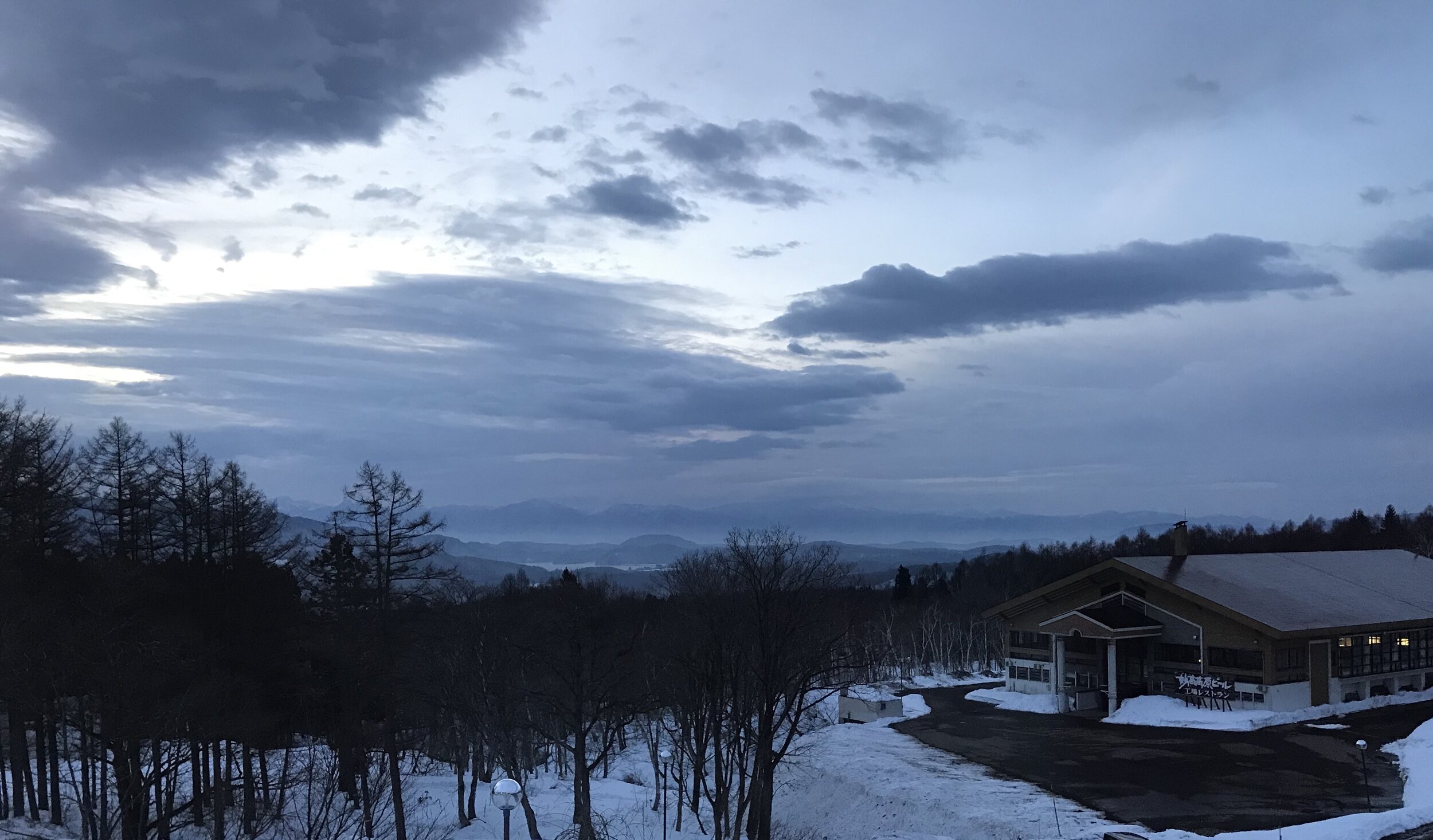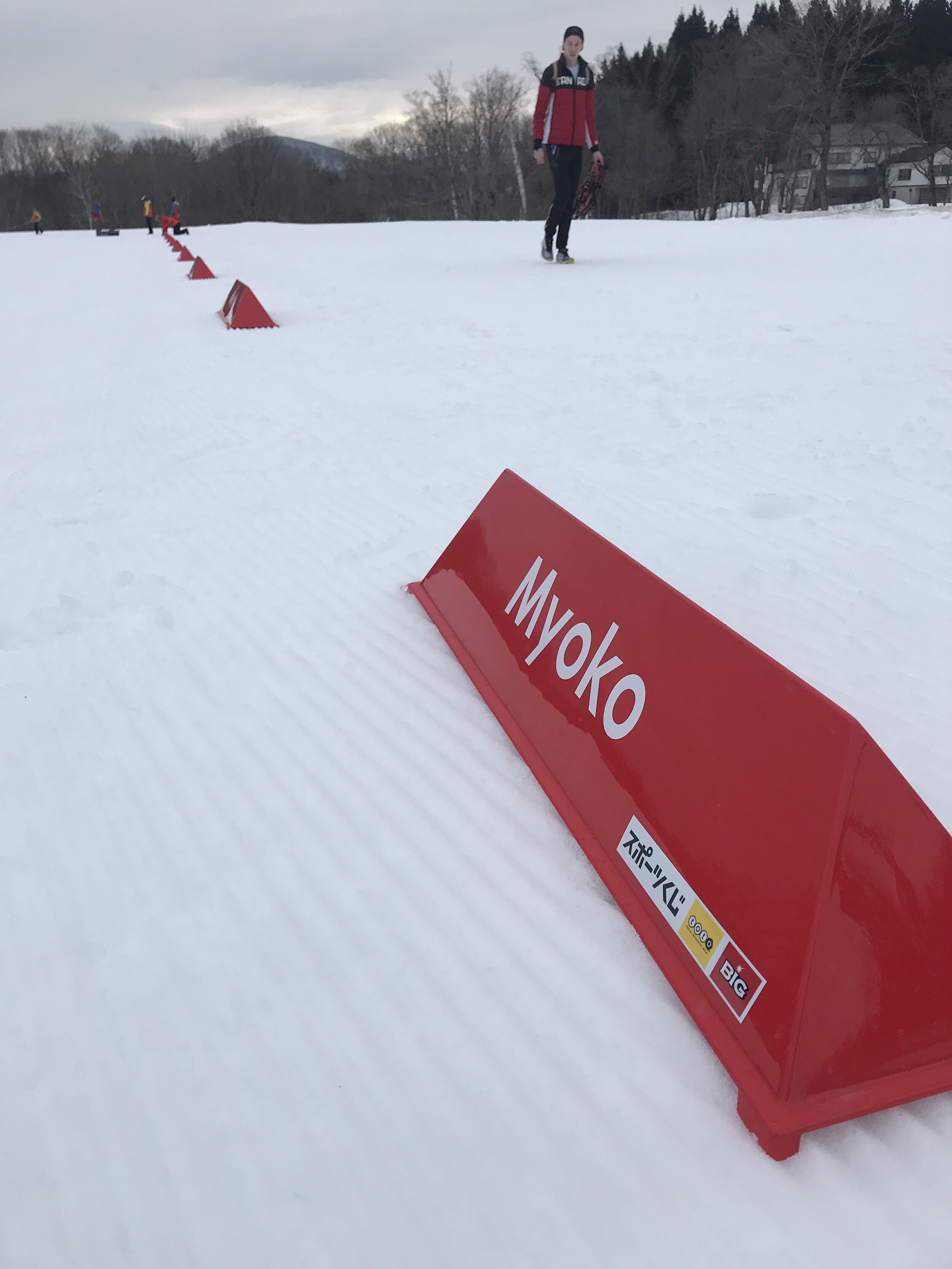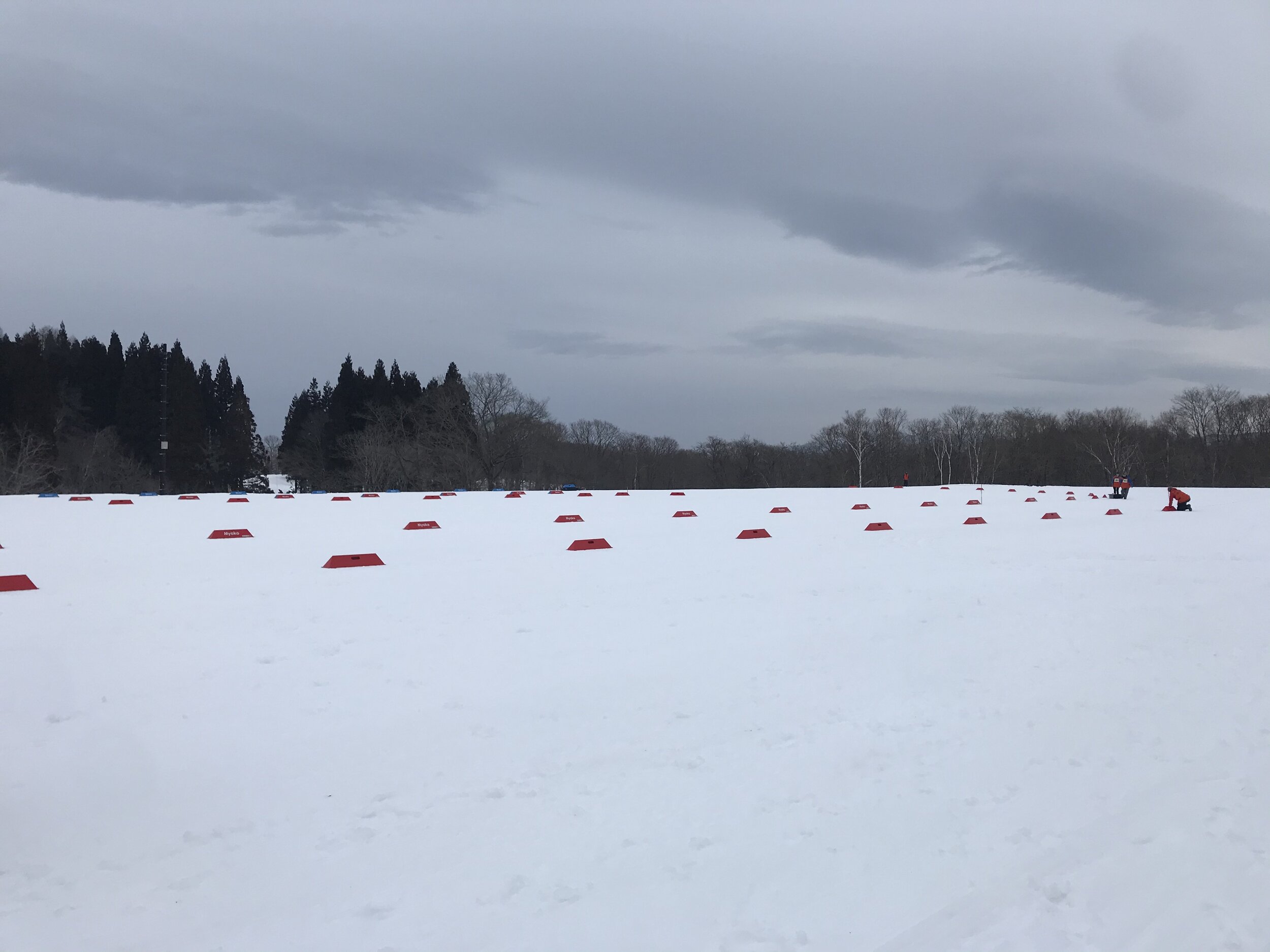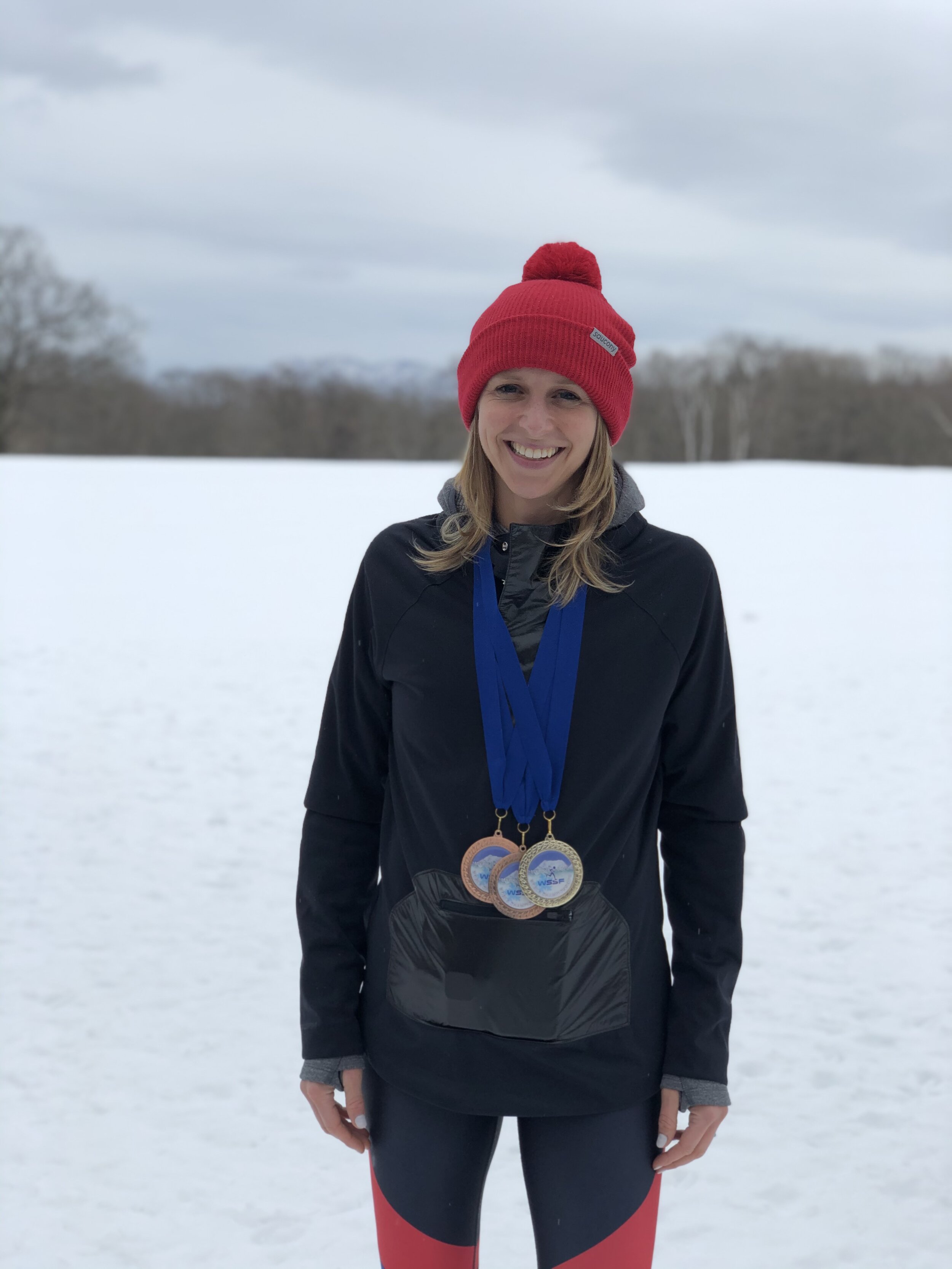2020 World Snowshoe Championships: A masterpiece
Be a masterpiece today.
Those were the words I scrawled across the page of my journal the morning of the 2020 World Snowshoe Championships.
One of the pivotal moments in my eating disorder recovery was when, on a silent, day-long retreat in Arizona I began to think of myself as a ‘work of art.’ For so long my struggle with anorexia and bulimia had made me feel like I was helplessly messed-up. That there wasn’t anything redeemable about my life, that I’d taken my one opportunity and ruined it. Shifting my perspective and my thoughts to consider myself in a positive light--a work of art-- was the beginning of change.
I am a work of art. I always have been. It’s just taken me so long to see that and even longer to fully believe it. And another few years to actually LIVE it.
As the race in Myoko, Japan approached I felt confident, not intimidated or out-of-place as I had felt the year before in Italy. I know I can compete at a high level and depending on who shows up on any given day, I’ve got a good shot at a top ten spot. My goal going into this year’s championship was to better my position from 2019 ( I finished 9th) and land in the top five, I also wanted to finish as one of the top three American women and have my time count for team scoring (in 2019 I finished 4th American). Even though I had articulated these goals, it wasn’t really about the achievement of them. Goals really aren’t about the outcome, they are an avenue to discovering who you are--it’s the trajectory that a dream-big goal sets you on that’s exciting.
What running gives me is an opportunity to live to the limit of my full potential, to explore the boundaries of my being and in so doing continue to create the work of art—the masterpiece that I am.
*
When we reached Myoko we were surrounded by snowy, rocky peaks. Draped in fog, it seemed like a painting, a mystical work of ancient art. It made me think of my Grandfather, he fought in World War II. A Marine stationed in Okinawa, he was the mortar specialist in his company. He didn’t really want to be part of war he was a creative, generous, kindhearted man and deeply connected to his faith. In a memoir he wrote for our family, he describes his experience in the War, illustrated with his expertly drawn maps and figures. My grandfather was an artist, his watercolors and oil paintings hang in our home and the homes of everyone in my family. He sold many of his works in galleries in and around Bethlehem, Pennsylvania—they are undoubtedly in the homes of many other families as well.
“Artist on the Delaware” by my Grandfather, Marius Bressoud.
In his account, he describes an instance where he and a Japanese solider came face to face on a path they were both patrolling. For whatever reason, neither of them shot at one another—perhaps recognizing the humanity in the other. Later, my grandfather was shot in the back, the bullet entering the left side of his chest and exiting through his armpit. He describes the bullet that was used: instead of the anti-personnel ammunition that was used earlier in the war, the bullet was armor-piercing (used by the Japanese in the later stages of the war) and so it entered and exited cleanly. Had it not been so, I would not be here.
I thought of him often in anticipation of our trip to Japan and even more so once we arrived. At the very end of his memoir, he relays to his readers (my family) what the war taught him: “Every day is a gift to be lived to the limit of our full potential.
To the limit of our full potential.
That has stuck with me from the moment I read his words as a teenager until now. I’ve rewritten those words countless times in my own journals, they echo through my mind. And so when I looked out my hotel window in Myoko the morning of the race, out over the whips of fog that shrouded the mountain range beyond, I thought of him, of his art, of his deep gratitude and generosity and love. I know he was proud of me, regardless of what I accomplished, but I think he would be especially proud of this moment.
*
I am a work of art.
I am a masterpiece.
Today, you add to the masterpiece, I wrote in my journal. The course your canvas, your effort the medium, each step a stroke of your brush. You’re adding to the work of art that you are, adding to the mural.
I felt that regardless of the outcome, success would not be defined by place, but by my effort, by what I could do with what I had on this day.
*
It was on the hills that we pulled away: first, second and myself in third. I spent the first lap keeping things in check: recover on the downhill, steady on the uphill and save something. When my mind wandered to what the story might be, how the outcome might play out, I’d bring my focus back to this: You’re adding to the masterpiece. Each footstep is a brushstroke. And I’d be there back in the effort, out of my head and in my body. I returned to that over and over, and as I did I gained on second the second woman. Each step a brushstroke. Swish, swish through the soft snow.
The conditions on race day were not ideal, but they also weren’t the worst I’ve ever run in. The course had been modified from its original 12K looping course to a small 3K look, which we would run three times. I’d liked the look of the original course, long climbs with descent gain--I felt it would be to my advantage. The new 3K look looked more like a rolling cross-country course, and with warm temperatures and rain predicted the snow was bound to be insufferably soft by the third lap. But these were things I could not control. I could only control my effort and so that’s where my focus went: each step a brushstroke.
As we entered the second lap and I had closed the gap, 20 seconds off her shoulder. I watched her walk up the steepest section of the hill and realized that if I kept the pace I’d close in on her and I did. Make it. Make it. Make it. I repeated. This was my invitation to rise to the challenge. You can make it happen, Sarah. You can make it happen.
Before we left for Japan I stumbled upon a mantra I had heard on the REI Wild Ideas Worth Living Podcast as the host Shelby Stanger, talked about surfing big waves out in the Indian Ocean with a group of guys. She was a little out of her element, up against big waves the likes of which, she had never surfed before. She tried and failed, getting her ass handed to her by the ocean each time. Eventually, when the guys on the trip went out she started staying on the boat. Until one afternoon, Brian Keaulana, an expert surfer and waterman and leader of the trip, invited her out, challenging her to conquer her fear and give it another chance. As they waited for the perfect wave he coached her, and when a wave started to form he asked her, “You gonna go?” She took the challenge and as she popped up on her board she repeated over and over the mantra Brian had given her: Make it. Make it. Make it. She rode the giant wave, shot through the tunnel as it curled perfectly around her and came out the other side feeling emboldened by her experience. I listened to that episode the week before we went to Japan and felt so deeply that I was meant to hear it.
“You gonna go, Sarah?” an invitation to rise to the challenge echoed inside me. Make it. Make it. Make it. That would be my mantra.
*
We looped through the finish area and heading out for our third and final loop. I was five twenty seconds back. A few strides down the hill and I was on her shoulder. Ride her shoulder, Sarah. Wear here down. This is where it would get tactical. I’ve had two races this year where I’ve had that done to me, where I’ve led the whole race with someone riding my shoulder only to be passed in the last quarter mile. It was my turn. I’d seen her struggle on the hills and I felt that I was stronger, I’d be stronger. I pulled up on her shoulder, we ran side by side. I knew when I would make my move: the final little climb up to the field and the finish, that’s when I’d go.
We were side by side. Then I’d be just off her shoulder. Then a half stride ahead. I started to second guess my tactics. How would you run if she wasn’t here? How would you run if you were being chased? I gave a little more and started to surge ahead, breathing hard, working hard on that red line between what you can maintain and being totally gassed. I eased back a little thinking that if I passed her now I wouldn’t have enough for the final hill. I wanted to save something. You could be second, Sarah. You could take the silver.
Down the last steep downhill, slipping, sliding, skiing through the slushy snow: just stay upright, Sarah. I was a stride behind. Then up the hill she gave some more, two strides behind. Take it. Take it. Take it. I came back up, on her shoulder. Down the last little hill. One more, Sarah. Make your move. C’mon.
She surged up the hill into the field. I dug in, trusting my snowshoes in the slushy snow. Out into the field, all we had was 100m around the red barriers and then into the finish. I was two strides behind. Go, Sarah. Go. I could hear her teammates screaming her name, my husbands voice ringing across the field. Dig, Sarah. I closed the distance to a stride around the corner. Everything in my willed myself forward, but my legs wouldn’t respond, my breathing was heavy and fast—near hyperventilating.
There was the finish. There she was, an impossible few strides ahead. She kept the distance crossing 4 seconds ahead of me for second place, I strode across the line taking third.
“Third in the world, baby! You’re third in the world!” my husband hugged me.
*
Right around the new year, I wrote out “I am standing on the podium in Myoko” on a stack of sticky notes. I stuck them all over the house. In the fridge next to the beer I really wanted to drink but was saving. In the cabinet next to the snacks as a reminder to choose the most nutrient-dense foods. In the dry bar where I keep the red wine. On the coffee maker because I’d given up caffeine. On the mirror in my bathroom. On the screen of my treadmill. And then each morning, I wrote those words in my journal. For me it was all about the little things, in 2019 I was 20 seconds off of finishing third American woman. I wanted those 20 seconds. My goal was to get on that podium through the team scoring, I really didn’t think I’d be on the overall podium.
Yet, there I was receiving a bronze medal at a World Championship. There are a million ways I could diminish the achievement, I could make a good case that it isn’t a big deal, that I got lucky in the absence of talented runners.
You can only race whoever shows up, and that’s what I did. I worked hard, I showed up, I got a little lucky and I made it happen.
And so this trip, this race, this moment it’s added to the masterpiece of my life; it is me living to the limit of my full potential—a work of art.
-Sarah
PS. Show up. Believe you belong. See what happens.











